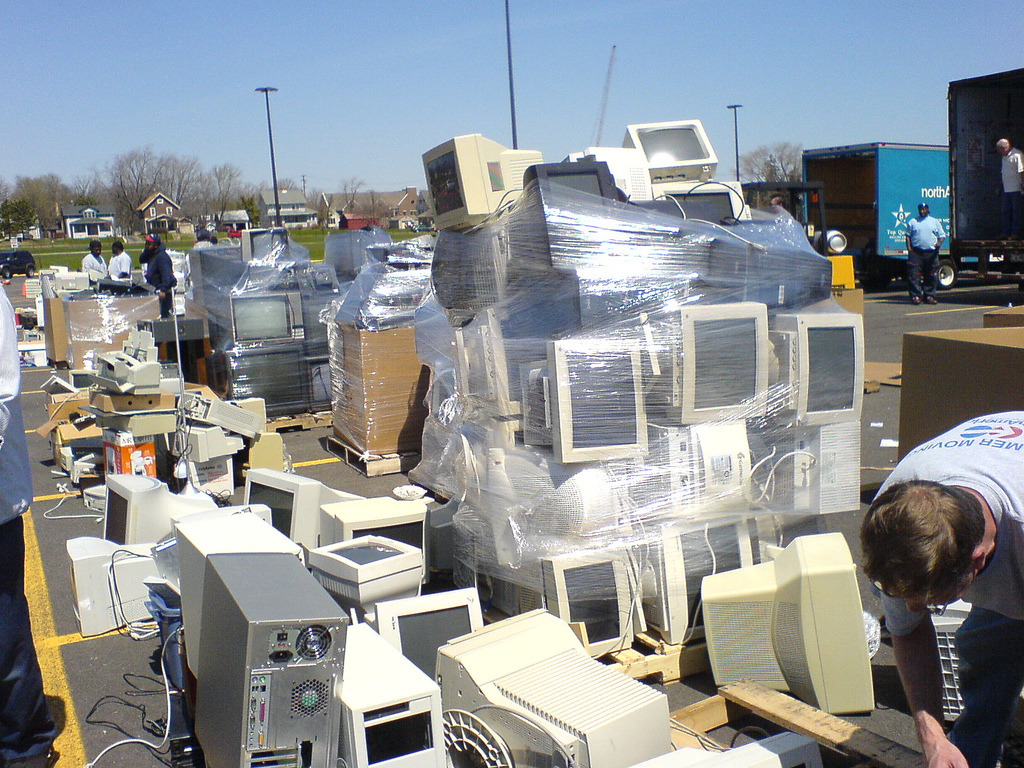Much of the 90 million pounds in e-waste Apple collected during 2015 was legally obligated, handled by outside firms, and probably not from Apple products, an analysis has concluded.
In 25 U.S. states, electronics manufacturers are required to do some level of e-waste recycling tied to marketshare or the weight of products sold, Vice said. The company in fact makes small reference to this in its latest Environmental Responsibility Report, where it mentions that it recycled "71 percent of the total weight of products we sold seven years earlier."
Since the report further notes that Apple is working with "over 160 recyclers around the world," the company is, most often, probably following a common practice of paying outside recyclers to claim a portion of their stream for legal purposes. In fact, phones and tablets frequently don't count towards state recycling quotas — so Apple may regularly be paying firms to recover materials from TVs, servers, and monitors. Outdated tube TVs in particular are believed to account for the largest share of the U.S. e-waste industry's recycled weight.
The director of the National Center for Electronics Recycling, Jason Linnell, told Vice that Apple is considered to be solid participant in state recycling programs, in fact lining up programs and e-waste contractors in states where there is no legal mandate.
The report also tried to dispel the idea that Apple may be profiting by recovering precious metals, such as the 2,204 pounds of gold it had quoted for 2015. Even if Apple were to sell the gold itself, it would likely just offset some of the expense of recycling programs.
Some Apple products are of course collected through the company's own programs, run in conjunction with firms like Brightstar. Recently it introduced "Liam," a robot specially designed to recycle Apple devices.
 Roger Fingas
Roger Fingas







 Charles Martin
Charles Martin


 Wesley Hilliard
Wesley Hilliard
 Stephen Silver
Stephen Silver
 William Gallagher
William Gallagher

 Marko Zivkovic
Marko Zivkovic









4 Comments
Apple recently picked up, and I assume recycled, dozens of pallets of computers from the university for which I work using a third party service. Almost all of them were Dells or HP. I wound guess that would be typical for enterprise organizations who used this same service from Apple.
One of the reasons why there's fewer Apple products in the recycle chain is that they last longer (I'm writing this on a late-2008 MacBook Pro) or they still have value when they're replaced (Pads and phones being handed down or sold). And while market share has been increasing in recent years (although lower overall sales), the vast majority of computers sold in the past have been PC clones. In my family, Macs and iPhones get handed down like old clothes.
When I've gone to these recycle events, I always look in the piles of stuff to see if there's anything that I might find useful (although I don't know that they let you take anything) and there's rarely a Mac in site. When there is, it's a really, really old one.
In NYC, TekServe, a big Apple dealer and repair place holds big recycle events several times per year. It's amazing how much stuff is brought to their events - pallets and pallets worth. What's amazing to me is how many people still have CRT TVs and monitors.
Well, that explains all the steel. I was wondering. And now I know. A bit disappointing. In fact, this whole "buying credits" thing is a bunch of BS, just as it is with buying "renewable energy credits". It's all just more opportunism finding ways of using the letter of the law/regulations/initiatives to defeat the spirit of them.